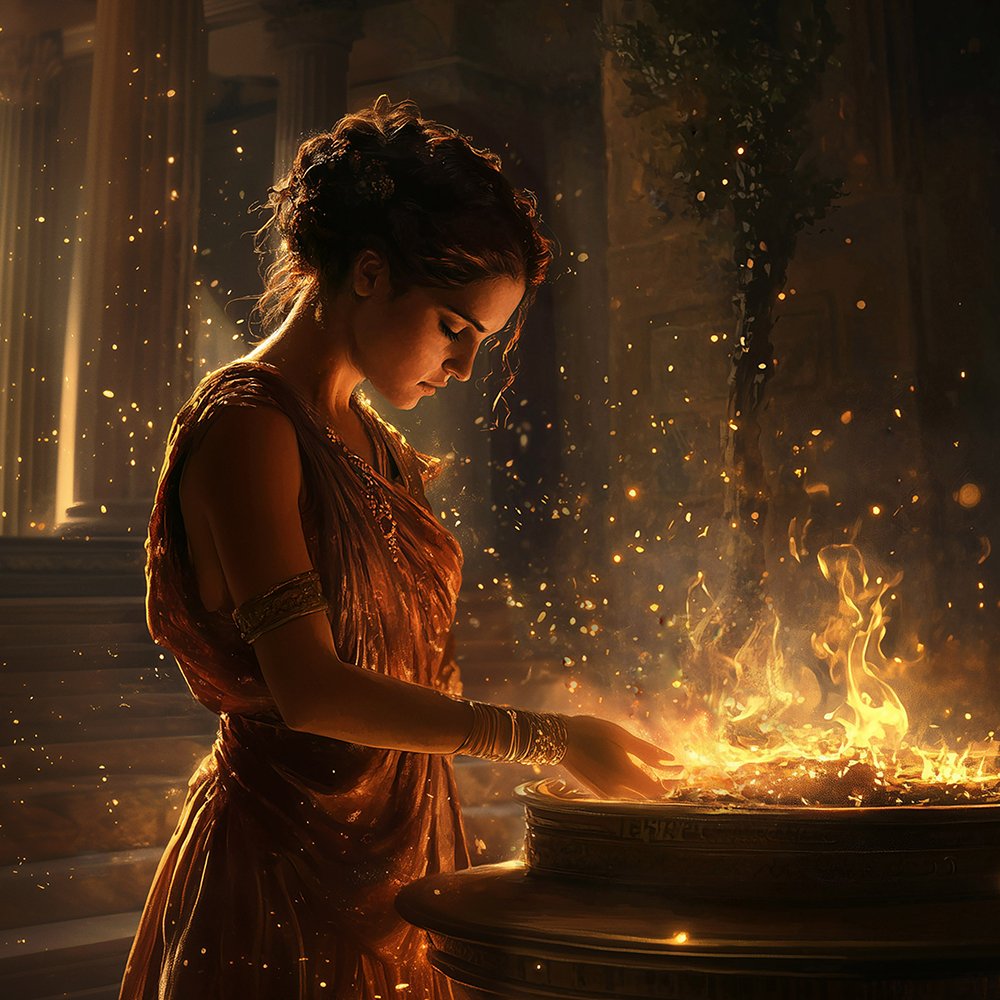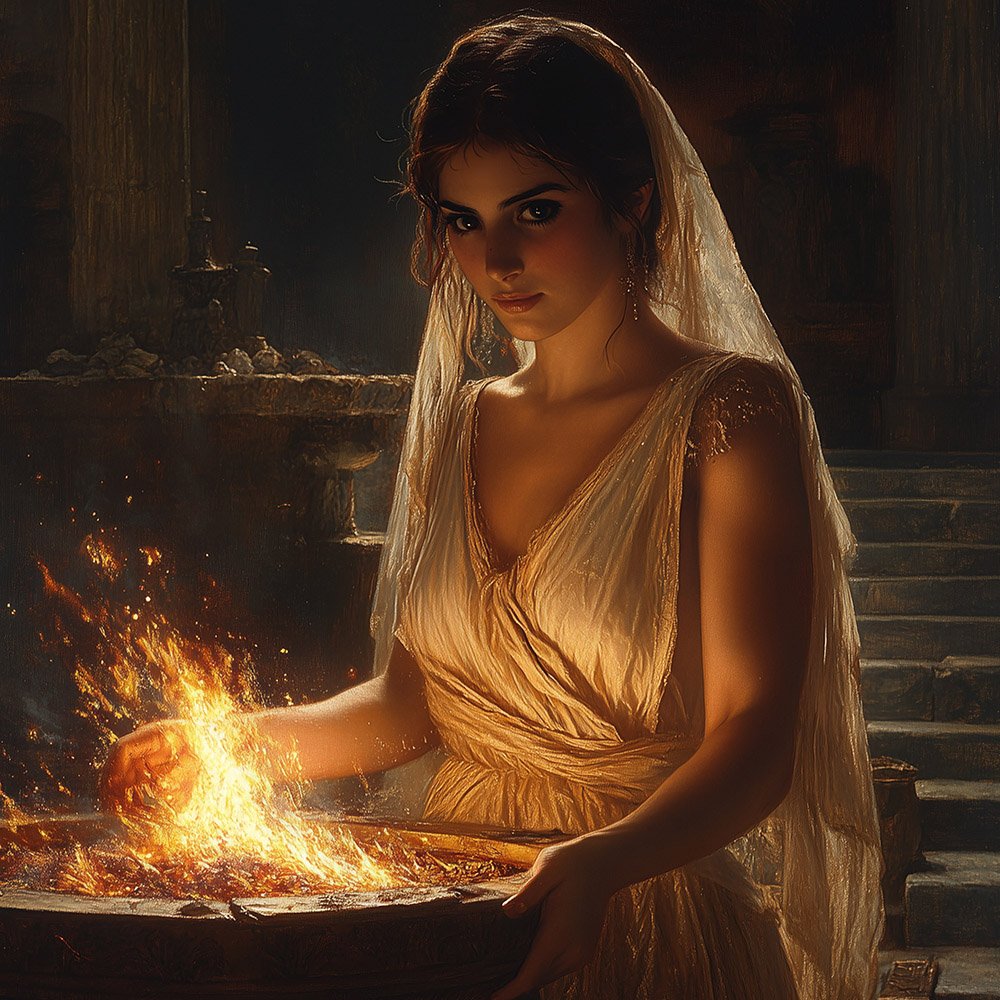Hestia/Vesta
As we embrace the cool, autumn season with its delightfully crisp October air, we begin our slow turn inward, a time of reflection when the warm glow of the hearth offers comfort and peace. This brings to mind Hestia, the Greek goddess of the hearth, home, and family. Unlike other fire deities, whose flames often symbolize destruction or transformation, Hestia’s flame embodies warmth, stability, and the nurturing power of the home. Known for her quiet, steady influence, she serves as a serene contrast to the more aggressive and volatile fire gods and goddesses. Her flame is a calm presence, teaching us that fire doesn’t always need to be loud to be powerful. As we gather around our own fires—literal or spiritual—Hestia reminds us that true strength lies in consistency and devotion.
Hestia holds a distinct position among the Olympians as the eldest daughter of Cronus and Rhea. When her father, Cronus, feared that his children would overthrow him, he swallowed each one at birth, attempting to prevent his fate. Later, when Zeus forced Cronus to release his siblings, Hestia was the last to emerge, quietly taking her place among the Olympians. While her brothers and sisters were drawn into dramatic power struggles and epic battles, Hestia chose a path of modesty and service. As the goddess of the hearth, she became the keeper of the sacred flame, ensuring it burned in both the mortal and divine realms. Her choice to maintain the hearth symbolizes her deep commitment to peace, familial bonds, and domestic harmony.
During the great battle to overthrow their father Cronus, Hestia chose not to participate in the violent struggle for control. Instead, she focused on tending the hearth, symbolizing the importance of preserving stability even in times of chaos. Unlike her siblings, who vied for power, Hestia’s role was to maintain the sacred flame, providing continuity and peace amidst the divine upheaval. Her steadfast presence reminds us that nurturing relationships and creating sanctuaries of love and support are powerful acts in their own right.
Though Hestia was highly sought after, with suitors like Apollo and Poseidon vying for her hand in marriage, she outwitted them in a way that was both peaceful and deeply symbolic of her character. Rather than engaging in rivalry or being drawn into power struggles, Hestia approached Zeus and swore a vow of eternal virginity, dedicating herself solely to the care of the sacred flame. By making this vow, Hestia not only preserved her independence but also ensured that her role as the protector of the hearth would remain unchallenged. This act reflects her autonomy and unwavering focus on her divine duties—choosing the quiet strength of service over personal entanglement. Unlike other goddesses whose narratives revolve around love or conflict, Hestia’s strength lies in stillness and nurturing, making her a figure of spiritual and domestic refuge.
In ancient Greece, the hearth was more than a physical space—it was the spiritual center of the home. Families gathered around the hearth to share meals, tell stories, and make offerings to Hestia, beginning and ending each day with a prayer for her blessing. Hestia’s sacred fire was never allowed to go out, symbolizing the unbreakable bond of family and community. Her fire provided warmth, food, and light, making her a guardian of domestic life. She was also honored at the Prytaneion (the civic hearth) in every city, reflecting her role as a protector of not just individual homes but entire communities.
In Roman mythology, Hestia was worshipped as Vesta, where her influence extended beyond the home to encompass the Roman state itself. While Hestia’s worship in Greece was centered around domestic life, Vesta’s role in Rome was far more public and civic. Vesta’s sacred flame was maintained by the Vestal Virgins, priestesses sworn to celibacy who safeguarded the eternal flame in her temple. The flame was seen as a protector of the state, and its extinction was considered a grave omen. The festival of Vestalia, held in Vesta’s honor, was a time when women sought blessings for their homes and families. Vesta’s presence reinforced the vital connection between home, state, and spirituality. Through Vesta, we see how the humble hearth, when tended with care, could sustain not only a family but an entire civilization.
Hestia’s role as the goddess of the hearth reflects a deeper spiritual significance. The hearth symbolizes the flame of life itself, providing warmth, protection, and the fuel necessary for growth. Hestia’s flame is the quiet, constant force that sustains the world. This flame represents spiritual and emotional well-being, requiring care and attention just as a hearth fire does. Hestia embodies the idea that true power lies in the ability to maintain peace, order, and connection—values that are foundational to both the home and the cosmos. Hestia is also often linked to Sagittarius, the calmest of the fire signs, representing the philosophical and steady aspects of fire. Sagittarius, ruled by Jupiter, is expansive but not explosive, embodying the steady light of a hearth that warms and nurtures, much like Hestia’s serene flame.
Today, her influence endures in modern spiritual practices. Her flame symbolizes the divine spark within each individual, representing the nurturing required to maintain our spiritual and emotional well-being. Lighting a candle in her honor invites peace, stability, and warmth into one’s life. She reminds us of the importance of tending to the small, daily rituals that form the foundation of our lives—rituals that sustain and nurture the soul. Through the gentle glow of her flame, Hestia teaches us that there is power in simplicity, and beauty in the steady dedication to what truly matters: hearth, home, and heart. Sometimes, the greatest strength comes not from grand gestures or dramatic feats but from the unwavering consistency of care and devotion. Her fire burns silently in the background, embodying the unseen efforts that keep life warm and bright. Though Hestia may not be the loudest or most theatrical of the gods, her presence is felt in every warm fire, every peaceful home, and every moment of quiet reflection. She is the goddess of stillness, the keeper of the flame, and the protector of that which connects us all—the home, the hearth, and the spirit of peace within.



